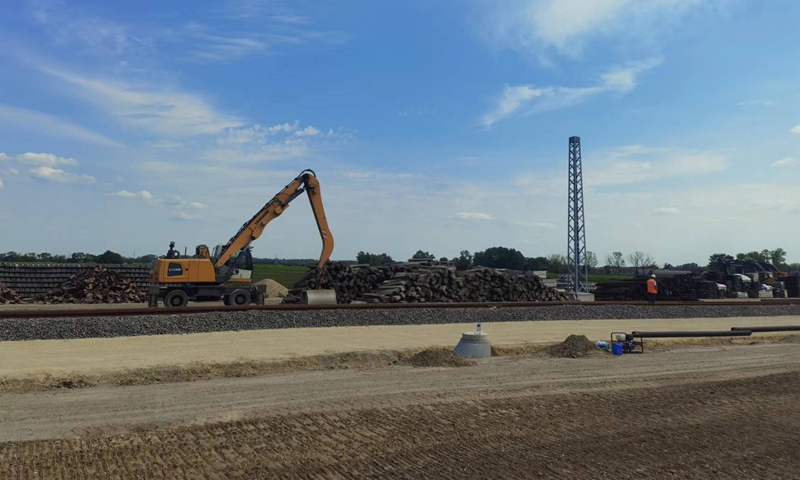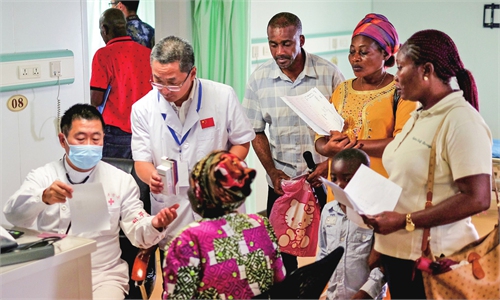Hungary's participation in the BRI a testament to its commitment to opening up to the East

A construction site of the Hungary-Serbia railway project in Taksony station, Hungary. Photo: Wang Wenwen/GT
Editor's Note:
This year marks the 10th anniversary of the Belt and Road Initiative (BRI) proposed by Chinese President Xi Jinping. Through the lens of foreign pundits, we take a look at 10 years of the BRI - how it achieves win-win cooperation between China and countries along the Belt and Road and how it has given the people of these countries a sense of fulfillment.
In a conversation with Global Times (GT) reporter Wang Wenwen, Dr. Norbert Csizmadia (Csizmadia), former state secretary in charge of planning coordination for the Hungarian Ministry for National Economy, former executive director for Central Bank of Hungary, president of board of trustees for John Von Neumann University, and independent director of the Bank of China Hungary, shared his views on the China-Hungary cooperation under the BRI. Csizmadia believes that Hungary's participation in the BRI is a testament to its commitment to opening up to the East.
This is the 12th piece of the series.
GT: What do you think of the advancement and development of the BRI over the past 10 years?
Csizmadia: The BRI is of utmost importance for a geographer and geopolitical thinker. It represents a unique and transformative global order. The BRI is not only the largest investment plan in human history; it marked the beginning of a new era for Eurasia.
The BRI is of great significance today due to its emphasis on three crucial aspects under the multipolar geopolitical world order: connectivity, complexity, and sustainability. The main mission and vision of BRI are to redirect the economic axis from the ocean to the mainland. It goes beyond just promoting trade and investment; it aims to build a global civilization that fosters ecological and job growth. Today, sustainability is becoming increasingly vital. The BRI represents a path toward peace, prosperity, innovation, and green development. It aims to connect civilizations, nations, countries, cities and people.
The BRI's impact is evident in various sectors, including commerce, where it fosters stronger connections between the EU and China. This increased connectivity carries immense significance for the global economy and international relations. We take great pride that Hungary was the first European country to join this transformative initiative.
GT: How does the BRI promote relations between China and Hungary?
Csizmadia: China and Hungary have enjoyed strong and fluid cooperation. There are around several direct flights from Budapest to various cities in China, such as Shanghai, Ningbo, Beijing and Chongqing. China and Hungary have collaborated in at least five key fields, including economic and infrastructure development, sustainable development, fair competition, investment promotion, and innovation collaboration. For example, there is a railway network connecting more than 160 cities in 22 European countries. Notably, the Budapest-Belgrade railway is one of the most significant infrastructure developments. It connects not only Budapest and Belgrade but also serves as a vital connection linking Piraeus to Hamburg across Europe. The Middle Corridor is also becoming increasingly important for future cooperation.
Hungary's "Eastern Opening" policy aligns well with the determined development of Europe's future. In the long run, cooperation between the East and the West fosters sustainable economic and social development. Hungary's participation in the BRI is a testament to its commitment to opening up to the East. The project in Hungary has seen fruitful cooperation between China and Hungary in areas such as energy, climate governance, and technological innovation.
Hungary's strategic geographical location at the heart of Europe, along with its strong industrial base, makes it an essential partner for China. Economic foreign investments from China have been attracted to Hungary due to its membership in the EU, making it a competitive destination for real investments. Hungary serves as a strong gateway between the West and the East, boasting robust political and economic stability, a distinct cultural identity, strong connectivity, and a well-established industrial base.

Norbert Csizmadia Photo: Courtesy of Csizmadia
GT: Italy is said moving to withdraw from the BRI. Is Hungary facing any pressure regarding cooperation with China?Csizmadia: The current Hungarian government values the BRI's stability and independence and are determined to follow their own path and do not appreciate being told to do what to do by other countries.
It is very important to understand geopolitics in the right way. Just like Yin and Yang, there are differences between the North and South. Everyone, including the US and Western countries, always thinks about the East and West. I believe the real thing we should focus on is learning from China's geoeconomic thinking. So, it's not just about the importance of the North and South geographically. Geographically in the North, you can find vast lands and focus on energy, pipelines, infrastructure, and logistics - what I call "hardware." The Eurasian region in the South, on the other hand, characterized by numerous islands, prioritizes efficient transport systems, including main transportation hubs, airplane connections, and maritime links, making it faster and more connected. As a result, the focus in the southern part lies on the "software" aspect, such as intellectual culture, technological software, and financial cooperation.
GT: The EU has proposed the Global Gateway to counter the BRI. Do you believe it will be effective in Europe? Can it be seen as an alternative to the BRI?
Csizmadia: No, I don't see it as an alternative. It reflects a Western perspective. China's approach is about cooperation, connectivity, and a peaceful win-win situation. I recall the first EU-China Forum in 2018, which was crucial. The EU's Global Gateway proposal, following the BRI, might be problematic in terminology. "Belt and Road" signifies connectivity, while "Gateway" implies merely an entry point. The program entails an investment of about 300 billion euros.
Today, we live in a multipolar world . Europe's issue lies in its technological competitiveness, which extends beyond recent times. Europe must grow stronger, focusing on cooperation. Hungary exemplifies this as a European nation, emphasizing peaceful collaboration, not just with China or the Belt and Road but also with other Asian countries.
For instance, as a geographer, I've come to realize that throughout history, lucky latitudes from Shenzhen to Lisbon, spanning over 10,000 years, have housed philosophical civilizations. The East-to-West spread of agricultural revolutions symbolized harmony and peace. Thus, the revival of the ancient Silk Road is of utmost importance. The lucky latitudes, however, is undergoing a shift. I've identified what I term the "KIDSingChi Axis" - Korea, Israel, Dubai, Singapore, China's hubs, and global financial centers like Beijing, Shanghai, Shenzhen, Chongqing and Chengdu, which epitomize innovation.
Looking forward, Hungary, as a role model, needs to identify what this global gateway hub can contribute to the world: education, technological vision, tourism, creative and culture industry, health industry and strong values. Additionally, we need to focus on three other key aspects: complexity, connectivity, and sustainability.
GT: The EU, following the US, has been calling for an economic "de-risking" from China. What do you think of this term? Do you think it deviates from global trade trends?
Csizmadia: Our approach should be focused on a sovereign, pragmatic and positive perspective. How can we foster connectivity? I believe the best way to achieve this is through China's BRI. Let's take the example of the Northern Eurasian corridor. Amid challenges like the Ukraine-Russia crisis and sanctions between the EU and Russia, there's an ambition to construct a special "dam" across Europe and Asia by the Northern Eurasian corridor. As the result, the Middle Corridor strengthens. Kazakhstan connects through Turkey, reaching Istanbul, Budapest and other Western and European countries, bringing more opportunities.
Amid concerns about risks voiced by the EU, Hungary's belief in peace as the ultimate outcome resonates with our vision for a future of peaceful, rising and harmonious cooperation. For any nation to succeed, its vision for the future must be founded on strong values, emphasizing education, talent, technology, and culture. Furthermore, we should explore how this model can adapt to diverse nations, fostering peaceful connections. This perspective is pivotal, and it's how I perceive the situation.


